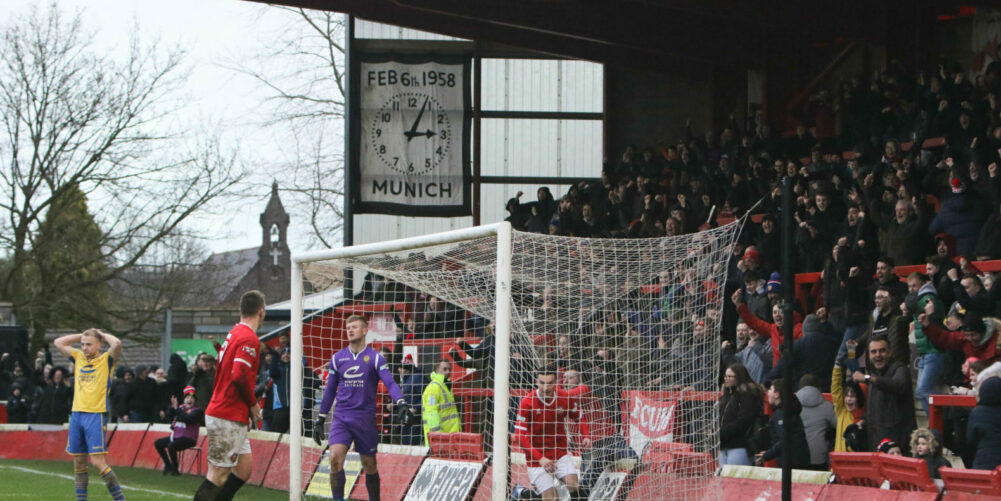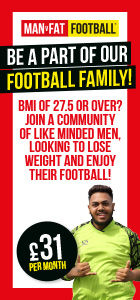Non-League football will have its challenges before returning to action
Mark Harris, Northern Premier League chairman, pens an exclusive column
You'll be delighted to know I'm not going to bang on about dual standards in football; the relative merits of points-per-game versus null-and-void, or even asking a supercomputer to predict whether Boreham Wood would have beaten Ebbsfleet away. Why? Because you're probably as bored with it as I am.
The problem with a news vacuum is that there aren't enough fresh stories to discuss. Some are still raging about ending the season early, others are navel-gazing over what the National League System should look like; smaller leagues, local derbies only and everyone playing everyone else every fortnight.
Rightly or wrongly, the world is trying to kick-start normal life, with mixed results. In football, the professional game is planning to resume in mid-June but big issues remain, such as persuading players it is safe to go training again – let alone play competitive football! Whichever way you look at it, social distancing on the field is a non-starter.
The Premier League's Project Restart initiative reflects football's reliance on broadcasting revenues. After all, £760m is a lot of money to pay back. Only the most naïve would truly believe that the professional game would act in tandem with Non-League. The similarities end with the laws of the game – and even that is questionable in the VAR era.
From a Non-League perspective, we need the Premier League to resume playing for interest to be re-ignited amongst sponsors.
Right now, the Northern Premier, Isthmian and Southern Leagues are looking for a new sponsor, which isn't proving easy. There wasn't a queue of interested parties before the COVID-19 crisis, and even fewer now.
Many brands have put a hold on marketing spend, those who have not slashed their budgets have either furloughed or made marketing staff redundant. It's not that we can't get arrested, but that there isn't a policeman in sight to do so.
Whilst Non-League lacks the numbers (and the broadcast coverage) to generate substantial sponsorship revenues, the value of football as a marketing vehicle starts at the top and filters downwards thereafter. Never under-estimate the power of following a trend. In the meantime we will carry on door-knocking.
Another challenge facing leagues and clubs in attracting external investment is that no-one knows when we will be playing football again. The government don't, the FA don't and we as leagues certainly don't. In the meantime, lots of work is going on now to prepare for when football can return safely – because there WILL be a next season.
Playing behind closed doors isn't a viable option for Non-League. Around 80-85 per cent of all club income comes from matchday activities, so no spectators means no revenue with which to pay players' wages, officials, transport to away games and other associated costs. Streaming games may offer a solution for clubs with large enough fan bases to pay for such a service and the technical capability to produce a video-based product that represents value for subscribers' money.
That's before taking into account the ability of supporters from opposing teams to also access the footage and how the revenues are split. The devil is always in the detail!
Then there's the question of what leagues do if (or when) the government permits competitive games to be played in front of limited crowds.
This raises a number of ethical, financial and practical issues. Ethical in that, as Watford's Troy Deeney has demonstrated, players cannot be forced to put themselves at risk. Financial in that, unlike the Premier League where circa £200,000 in testing costs can easily be absorbed, Non-League cannot afford it.
Practically, testing costs will probably come down but the logistics of applying testing across Non-League is a nightmare.
Could clubs police social distancing on the terraces? Albert and Harry have stood together for the last 30 years; who's going to stop them doing so now?
On the flipside, some clubs in the NPL have prepared detailed plans for dealing with such an eventuality.
The challenge is in ensuring that protocols work for clubs of all shapes and sizes. After all, how would the fans of FC United or South Shields react if only 500 of them can attend games in person?
How do you limit spectator numbers without digital ticketing technology when smaller clubs lack the fan numbers to justify the outlay?
At first glance it looks like an impossible task, but at a time when clubs are fighting for every penny of income, it is not acceptable to simply dismiss the concept outright.
This will be another issue for league boards to consider in the coming weeks. We may consult clubs but, as the National League have found recently, clubs usually vote in their own interests rather than the interests of all clubs.
During the crisis we have seen some great innovation at club level. Many have opted for JustGiving pages, others using digital platforms to sell season tickets or sponsorship. As a league, the NPL has just issued a summary of fund-raising ideas implemented by community-based sports clubs because we are all going to have to look at fundraising from a different perspective going forward.
And for those still expecting someone else to come along to bail out Non-League football, stop it. The Premier League and FA both face financial blackholes which means that there will be less resources, not more, in the short term.
Many things will have to change by the time we start playing football once again. Social distancing, unparalleled levels of hygiene amongst players, officials and fans alike.
In the meantime, we all need to stop obsessing over the past and focus instead on the future. Non-League football can only thrive if everyone comes together to make it work.


















